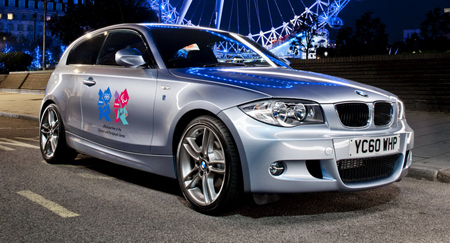![]()
You are welcome to share your thoughts on this article written by Tim Crow, Chief Executive Officer, Synergy, London
With less than a year to go to London 2012, Olympic sponsorship is virtually sold out, with over 50 partners signed up at global and domestic level by the IOC and LOCOG in deals worth $2billion combined. This makes it one of the biggest sponsorship programmes of its type in the world—it accounts for around one-third of total Games revenues—and certainly the most prestigious given that its members feature a plethora of iconic global brand owners such as BMW, Coca-Cola, Procter & Gamble and Samsung.
Photo: www.carscoop.blogspot.com, a BMW car with the London 2012 logo
Delivering a significant, measurable return on investment from these sponsorships is a unique challenge for the brands involved, because as with every Olympic Games, London 2012 has not offered sponsors the type of in-camera advertising rights (for example advertising hoardings or branding on athletes) that characterise most major event sponsorships, and which many brands use to varying degrees to justify their investments.
As such, Olympic sponsorship challenges marketers to approach sponsorship with a totally different mindset: how to use the unique Olympic brand and its values as an integrated marketing platform. The precedents are interesting: history shows that, worldwide, Olympic sponsors have generally struggled to fully embrace this approach.
And then there’s the brands who aren’t Olympic sponsors who will nonetheless be attempting to grab a piece of the action, which involves the not insignificant challenge of navigating the UK legislation designed to prevent ambush marketing.
Only time will tell who are the winners and losers in this particular Olympic contest, but in the meantime here are four areas to watch.
1. Britain and Britishness
A major theme of the Games will be Britain and Britishness. Team GB will become a superbrand, Union Jack will be everywhere. With numerous brands already leveraging this territory and more sure to follow, the marketing ‘Battle of Britain’ will be intense. Meanwhile, the state of the nation and the debate on the very nature of Britishness itself will be centre-stage in the media both at home and abroad.
2. Legacy
The ‘L’ word will be a recurrent theme in media coverage of London 2012. As in every host country, especially once the show is over, debate and analysis will begin in earnest as to whether the staging the Games and spending £9.3bn of public money on it was worth it. Brands that can demonstrate that they have played a credible and measurable role in helping to deliver Games legacies—whether sporting, social, economic or behavioural—will be at a decided advantage.
3. Social Mobile
With an estimated additional 2.5m tourists in London, many of them smartphone users, social mobile will be a key channel for brands looking to take advantage. Geo-location apps will go crazy with the influx of users looking for deals in London; recommendation apps and sites will direct people to special events or businesses; and mobile social networks will boom, creating a pool of people for brands to engage. If you’re a consumer brand looking to get in on the action next year and social mobile isn’t part of your strategy, you’ll miss out.
4. The Weather
You might think this is an odd choice, but remember the Vancouver Winter Olympics of 2010? The lack of snow became something of an issue. Fast-forward to next summer: the weather might be the difference between a good (or not so good) Games and a great one—both for consumers and for brands.
About the Author
![]()
Tim Crow became Synergy CEO in 2007 and has consulted on major brands for over 20 years and worked in 50 countries. Tim is a business leader of the Marketing Society and an expert in Sponsorship Strategy, Contract Negotiation, Exploitation Planning and Olympics.
